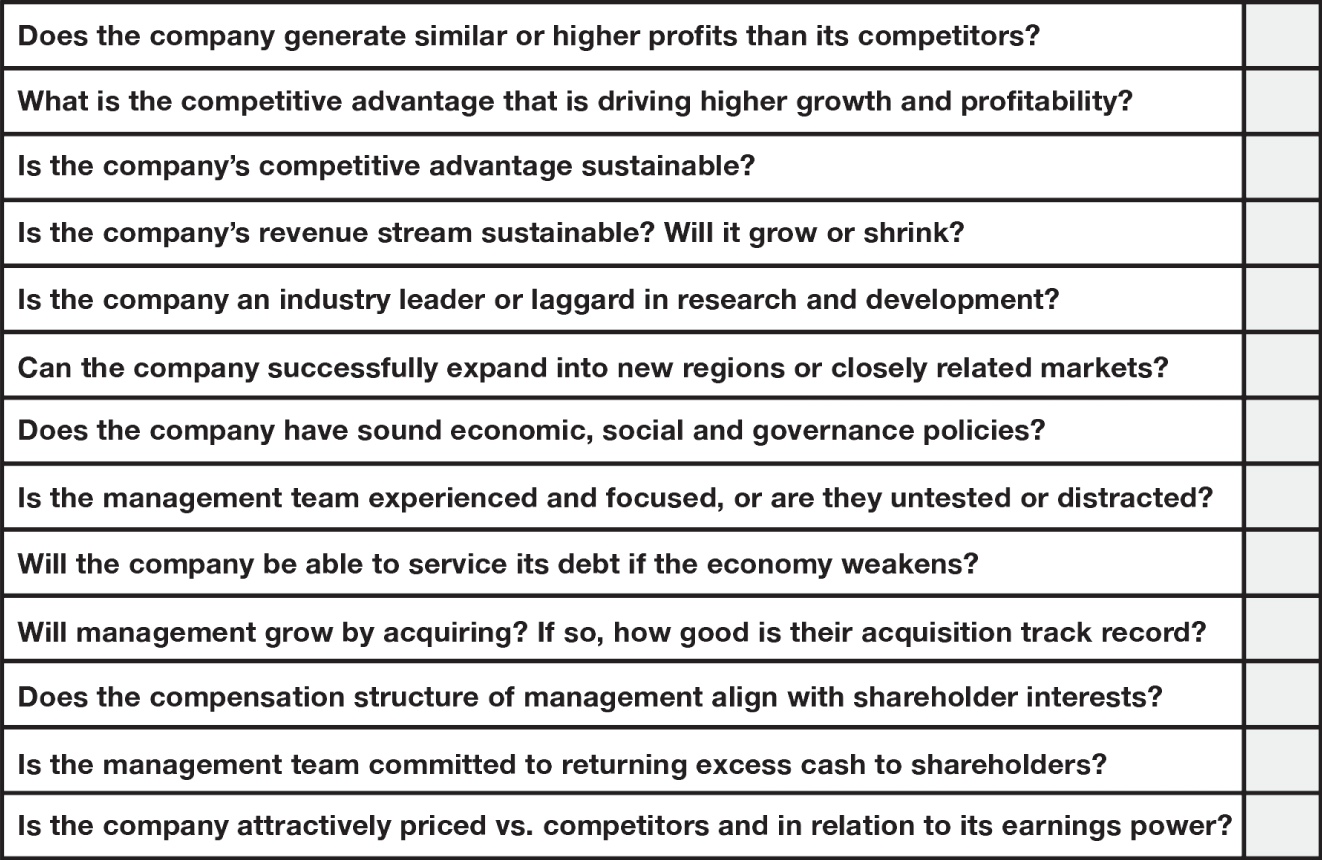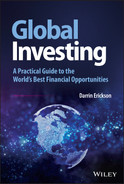TOOLS AND RESOURCES
________________
This chapter acts as a guide to some of the best resources available to you as an investor. If you want to maximize your chances for investment success, I encourage you to check each of these out.
Recommended Books on Investing
- Bogle, John. The Little Book of Common Sense Investing. John Wiley & Sons, 2017.
- Browne, Christopher H. The Little Book of Value Investing. John Wiley & Sons, 2007.
- Cunningham, Lawrence, Torkell T. Eide, and Patrick Hargreaves. Quality Investing: Owning the Best Companies for the Long Term. Harriman House, 1988.
- Dalio, Ray. Principles for Dealing with the Changing World Order. Simon & Schuster, 2021.
- Dalio, Ray. Principles: Life and Work. Simon & Schuster, 2017.
- Ellis, Charles. Winning the Loser's Game: Timeless Strategies for Successful Investing. McGraw-Hill, 2002.
- Fabozzi, Frank J. (ed.). The Handbook of Fixed Income Securities. 9th ed. McGraw-Hill, 2021.
- Fridson, Martin, and Fernando Alvarez. Financial Statement Analysis: A Practitioner's Guide. 5th ed. John Wiley & Sons, 2022.
- Graham, Benjamin. The Intelligent Investor: The Definitive Book on Value Investing. Harper Collins, 2006.
- Graham, Benjamin, and David L. Dodd. Security Analysis: Principles and Technique. McGraw-Hill, 2009.
- Greenblatt, Joel. The Little Book That Beats the Market. John Wiley & Sons, 2010.
- Greenwald, Bruce, Judd Kahn, Paul D. Sonkin, and Michael van Biema. Value Investing: From Graham to Buffett and Beyond. John Wiley & Sons, 2001.
- Horan, Stephen, Robert Johnson, and Thomas Robinson. Strategic Value Investing: Practical Techniques of Leading Value Investors. McGraw-Hill Education, 2014.
- Ibbotson, Roger G., and Gary P. Brinson. Global Investing: The Professional's Guide to the World's Capital Markets. McGraw-Hill, 1993.
- Malkiel, Burton G. A Random Walk Down Wall Street. W.W. Norton & Company, 1985.
- Montier, James. The Little Book of Behavioral Investing: How to Not Be Your Own Worst Enemy. John Wiley & Sons, 2010.
- O'Glove, Thomas L. Quality of Earnings: The Investor's Guide to How Much Money a Company Is Really Making. The Free Press, a Division of Macmillan, 1987.
- Marks, Howard. Mastering the Market Cycle: Getting the Odds on Your Side. Houghton Mifflin Harcourt, 2018.
- Marks, Howard. The Most Important Thing: Uncommon Sense for the Thoughtful Investor. Harper Business, 2018.
- Reinhart, Carmen, and Kenneth Rogoff. This Time Is Different: Eight Centuries of Financial Folly. Princeton University Press, 2011.
- Siegel, Jeremy. Stocks for the Long Run: The Definitive Guide to Financial Market Returns and Long-Term Investment Strategies. McGraw-Hill, 2002.
- Solnik, Bruno. International Investments. Addison Wesley, 1991.
Recommended Books on International Politics
- Allison, Graham. Destined for War: Can America and China Escape Thucydides's Trap? Mariner Books, 2017.
- Brzezinski, Zbigniew. The Grand Chessboard: American Primacy and Its Geostrategic Imperatives. Basic Books, 1997.
- Holsti, K.J. International Politics: A Framework for Analysis. Prentice-Hall, 1988.
- Kennedy, Paul. The Rise and Fall of the Great Powers. William Collins, 2017.
- Waltz, Kenneth. Theory of International Politics. Waveland Press, 2010.
Websites: Market Data and Commentary
- AlphaStreet (https://news.alphastreet.com/) is a one-stop shop for financial news, data, and investment resources. AlphaStreet offers a wealth of insightful research and detailed company analysis.
- Bloomberg (https://www.bloomberg.com/) provides timely financial market news and features stories of interest to investors (paid subscription required).
- Google Finance (https://www.google.com/finance/) is a source for market-related data, including stock charts and basic historical company data.
- Investopedia (https://www.investopedia.com/) is a leading provider of financial news: original studies, research, data analysis offering an abundance of investment dictionaries, advice, reviews, ratings, and comparisons of financial products. Includes an up-to-date news section covering the latest from corporations, global markets, and politics.
- Pitchbook (https://pitchbook.com/) is a provider of the key financials of global, public, and private companies. This includes access to the balance sheets, cash flow statements, income statements, financial ratios, and more from 3,343,263 private companies and 59,374 public companies worldwide. Access requires a paid subscription.
- Seeking Alpha (https://seekingalpha.com/) is a paid service providing company analysis from independent analysts.
- Yahoo Finance (https://finance.yahoo.com/) is a source for market-related data, including stock charts and detailed historical company data. Yahoo Finance even provides some basic ESG rating information.
Stock Chart Services
- StockCharts (https://stockcharts.com/) is a paid service that makes it easy to create high-quality financial charts in just a few simple clicks. It allows users to run custom scans to find new trades or investments, and set automatic alerts for your unique technical criteria, and provides daily market commentary from industry-leading technicians.
- Symbolik (https://www.symbolik.com/) is a paid service offering access to indicators developed over a period of decades by famed investor Tom DeMark. The DeMark indicators have a wide following and can be helpful in identifying the beginning and end of trends in stock prices.
Ratings and Analytics
- MSCI Inc. (https://www.msci.com/) is a leading provider of global market data, offering a wealth of insightful research and market commentary, including ESG ratings for over 2,900 publicly traded companies.
- IHS Markit (https://ihsmarkit.com/index.html) is a leading provider of information and analytics. While most of the company's data is accessible only by paid subscription, they do offer some well-thought-out research via podcasts and their website.
- S&P Global Inc. (https://www.spglobal.com/) is a leading provider of global market data offering a wealth of insightful research and market commentary, including sovereign credit ratings.
Websites: Economic Data
- The American Petroleum Institute (https://www.api.org/) provides rig count data and other useful information for the energy sector.
- The Chicago Mercantile Exchange (https://www.cmegroup.com) is one of the world's leading derivatives marketplaces. The website provides useful data and analysis of a wide range of derivatives on commodities, interest rates, equities, and currencies. Investors can use this information to create a WTI strip curve for analyzing the energy sector.
- The Energy Information Administration (EIA) (https://www.eia.gov/) is an excellent resource to decipher the endless acronyms of the energy world from WTI to Mboe/d to OPEC to LNG.
- The National Association of Realtors (https://www.nar.realtor) provides data relating to new home sales.
- The Oil & Gas Journal (https://www.ogj.com/) brings in the pertinent articles from EIA, OPEC, and API, if you want a one-stop shop for energy sector information.
- OPEC, the Organization for Petroleum Exporting Countries (https://www.opec.org/opec_web/en/), provides an insightful global perspective on oil supply and demand.
- US Census Bureau (https://www.census.gov/) is a source for US economic data, including new building permit activity.
Websites: Regulatory Filings
- AnnualReports (https://www.annualreports.com/) is a provider of 112,775 annual reports from 9,187 international companies.
- EDGAR (https://www.sec.gov/edgar.shtml)—The US Securities and Exchange Commission created the EDGAR (Electronic Data Gathering and Retrieval) website to provide easy access to the financial statements filed by companies listed in the United States.
- SEDAR (www.sedar.com ) is the official Canadian site that provides access to most public securities documents and information filed by issuers with the 13 provincial and territorial securities regulatory authorities.
- SEDI, The System for Electronic Disclosure by Insiders (SEDI) (www.sedi.ca), is Canada's online, browser-based service for the filing and viewing of insider reports as required by various provincial securities rules and regulations. SEDI replaces paper-based reporting and provides for an efficient disclosure process.
Websites: Investment Education
- CFA Institute (www.cfainstitute.org)—In addition to administering the Chartered Financial Analyst designation (highly recommended for anyone interested in any investment-related career), CFA Institute provides free insightful articles related to investing through the CFA Institute Research Foundation.
- Investopedia (https://www.investopedia.com/)—A leading provider of financial news: original studies, research, data analysis offering an abundance of investment dictionaries, advice, reviews, ratings, and comparisons of financial products. Includes an up-to-date news section covering the latest from corporations, global markets, and politics.
- WallStreetPrep (https://www.wallstreetprep.com/)—Provides online courses and instructor-led bootcamps to prepare students and professionals for the demands of investment banking and corporate finance.
Social Media
RenMac—(@RenMacLLC) Follow Jeff DeGraaf and the team at RenMac on LinkedIn and Twitter for insightful, regular updates on the equity markets, including thoughts on where we are in the market cycle.
Company Checklist

..................Content has been hidden....................
You can't read the all page of ebook, please click here login for view all page.
